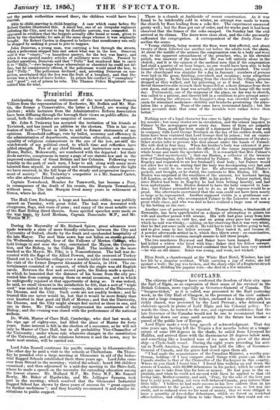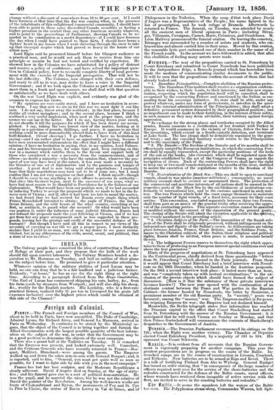SCOTLAND.
The citizens of Glasgow have conferred the freedom of their city upon
the Earl of Elgin, as an expression of their sense of his services in the British Colonies, more especially as Governor-General of Canada. The "burgess-ticket," as it is called, was presented to the Earl yesterday week, in the City Hall of Glasgow, in the presen.ce of the civic authori- ties and a large company. The ticket, enclosed in a large silver gilt box richly chased, was presented by the Lord Provost ; who delivered an elaborate speech in praise of Lord Elgin and his Colonial policy. To- wards the close, he turned to the war, and expressed confidence that the late Governor of the Canadas would not be one to recommend that we Mould lay down our arms until security for the future has become a., parcel of the public law of Europe. Lord Elgin made a very long speech of acknowledgment. That day nine years ago, having left the Tropics a few months before at a tempe- rature of some 100 degrees in the shade, he sailed from Liverpool for Halifax, and arrived there with the thermometer 20 degrees below mese, and something like a hundred tons of ice upon the prow of the stout ship—a Clyde-built vessel. During the eight years preceding Ins arri- val in North America, four statesmen had held the office of Governor- General of Canada, and the grave had closed upon them all.
"r had made the acquaintance of the Canadian Minister, a worthy gen- tleman, holding—if I may compare email things with great—an office in Canada similar to that of the Chancellor of the Exchequer in this country. Where do you think I found him ? I found him walking up and down the streets of London with 60,000 debentures in his pocket, which he could not get any one to take from him for love or money. He had gone to the ca- pitalists, surd when he could not emceed with them he applied to that old loving lady, Mother-country, and said, Pray, for the sake of the love you bear to your poor, Jiuling, not very well-behaved Canada, pray indorse these little bills.' I believe he had more success in his love addrms than in his other addresses to the pocket ; and the consequence was, so low was our credit, and so reduced were we for want of money, that we were obliged to issue a quantity of five-dollar debentures, which we forced on wretched office-holders, and obliged them to take these, which they could not ex-
change without a discount of somewhere from 10 to 20 per cent. If I could have foreseen at that time that the day was coming when, in the presence of the inhabitants of this enlightened commercial community, I should have been able to.point to these same discredited Canada securities as having a higher premium in the market than any other American security whatever, and to point to the proceedings of Parliament, showing Canada to be re- garded in its constitution as a model dependency—if I could have foreseen -the day when I could have pointed to these facts, I should have borne a lighter heart in my bosom when I went shivering through the snow to take alp that viceregal sceptre which had proved so heavy in the hands of our ablest men."
Lord Elgin said he presented himself before his Glasgow audience as a practical man, and he would not ask them to receive from him one -principle or maxim he had not tested and verified by experience. He showed how in the Colonies we have substituted for a policy of distrust and reserve a policy of confidence ; and have solved the important ques- tion in Colonial policy, how to reconcile complete liberty of local govern- ment with the exercise of the Imperial prerogative. mat will not be the last difficulty. The Colonies, now charged with their own defence, and ready to aid as in war, may desire to have a voice in the Imperial Government; and if we look upon the Colonies as part of ourselves, and meet them in a frank and open manner, we shall deal with that question as satisfactorily as we have dealt with others.
• On the war Lord Elgin was explicit, and evidently was glad of the occasion to express his views.
"My opinions are very easily stated, and I have no hesitation in avow- ing them. I my that now we are in for this war we must fight it out like men. I do not say, throw away the scabbard ; in the first place, because I dislike all violent metaphors ; and in the second place, because I think a scabbard a very useful implement, when used at the proper time, and the sooner we can use it the better. But I do say, having drawn your sword, do not sheathe it till the purposes for which it has been drawn are accom- plished. I say, taking the very lowest view of the matter, looking at it amply as a question of pounds, shillings, and pence, it appears to me that nothing could be more demonstrably absurd than to leave work of this kind half-finished. (Great cheering.) I go further. I have no hesitation in saying—and I am rather glad to have an opportunity of saying, because I have seen unwarranted statements to the effect that I might have a different opinion—I have no hesitation in saying, that, in my opinion, Lord Palmer- ston and his Government have, for sense time past, been carrying on this war in a manner which entitles them to the favour and support both of those who considered a war a necessity from the commencement, and of others—no doubt a minority—who have the opinion that, whatever the pro- spect of war may have been at the outset, it was soon made a necessity by the blunders of one set of diplomatists and by the passions and temper of another. A great deal is now being said about negotiations : I earnestly hope that these negotiations may turn out to be of some use; but I must confess that I am not very sanguine on that point. I think myself—though should be sorry to say anything to give offence to persons in authority— that since this business began next to the successes of our arms, what we have had most reason to be thankful to Providence for is the failures of our ,diplomatists. What would have been our position now, if we had succeeded in inducing Turkey to accept the proposals which we made to her in the fa- mous note of Vienna; and if, after it had been too late to mend the matter, we had found that we had secured for Russia every single thing which Prince Menschikoff intended to obtain ; the eagle of France, the lion of Great Britain, and the wild beasts of the other country, crouching at her fret, 88 sentinels, to guard what she secured ? Or what would have been our position if, under the influence of some judicial blindness, Russia had not refused the proposals made the year following at Vienna and if we had, got from her any paper arrangement such as was suggested in these pro- posals, leaving her the prestige and credit of the successful defence of Se- bastopol? But though I have said all this in respect to my views of the necessity of carrying on war till we get a proper peace, I most distinctly declare that I yield to no man, not only in my desire to see peace reesta- blished, but.in my abhorrence of the evils, moral, social, and political, that a state of war involves."



























 Previous page
Previous page